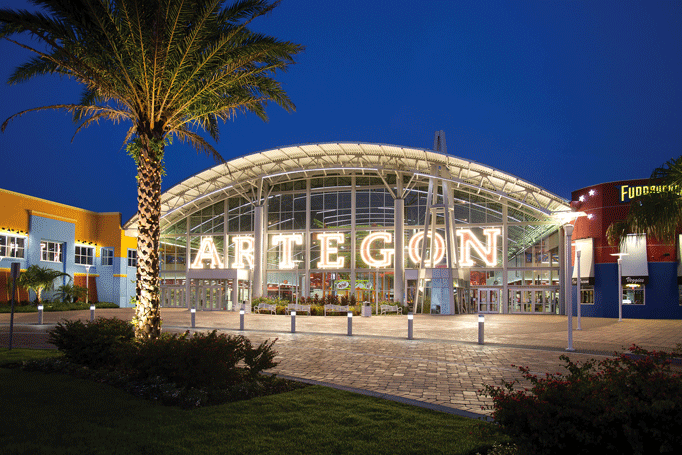
Artegon Marketplace has made a niche for itself by eschewing national retailers. Promoted as “the anti-ordinary anti-mall,” this 865,000-square-foot indoor marketplace in Orlando, Fla., showcases the work of local artists in about 150 studio showrooms from which their custom furniture, blown-glass articles, apparel and similar craft wares are produced and sold.
To be sure, there are a few major chains in the mix: Bass Pro Shops, Boot Barn, Cinemark, Fuddruckers and a handful of other national brands were already in place before landlord Lightstone Group acquired the property in 2010. And those stores have good reason for staying, considering Artegon’s 93 percent occupancy rate and healthy consumer traffic. The center welcomed nearly 2 million visitors in the seven months following the completion last November of a renovation. Cinemark and Boot Barn in particular have each invested millions of dollars to upgrade their Artegon spaces.
Otherwise, though, as for the space currently available for lease at Artegon, national brands need not apply. “We are ‘anti-ordinary,’ ” said Amy Higgins, a vice president of leasing at Lightstone Group and head of the team that signed up about 100 tenants to the property last year. “If we start bringing in national brands, it would dilute that charm.”
The project, built in 2003 as Festival Bay Mall, struggled to compete for tenants against nearby outlet stores and open-air shopping centers. When Lightstone Group took over, it made the bold decision to tap into Orlando’s vibrant artisan community for tenants, offering shoppers the opportunity to buy one-of-a-kind goods directly from local producers. After a multiyear renovation that removed Festival Bay’s namesake artificial lake, the property was reborn as Artegon Marketplace in November 2014. The former lake space was converted into an entry plaza and a hall that houses Sky Trail, a sprawling indoor-ropes course. Initially, the owner built rows of cagelike enclosures for lease as artists’ studios, but leasing and sales came short of what planners had hoped. Occupancy in late 2014 was below 40 percent.
In June 2015 Lightstone hired David Miskin as chief creative officer, directing him to identify the source of Artegon’s difficulties and get the project on track. Miskin realized that many of the small studios were all-workshop and no-showroom — an inhospitable reality that was unlikely to draw visitors. Furthermore, few of the tenants possessed the retail expertise to understand the problem or to make their spaces more shopper-friendly. Over the next four months, Miskin’s six-person visual-merchandising team worked with tenants to help them design and build storefronts uniquely reflective of the craft and merchandise of each. Miskin redid the restrooms using white subway tile and trendy lighting and replaced common-area seating with whimsical, squiggle-shaped benches in purple, blue and green.
Artegon Marketplace earned a Silver in the traditional-marketing category of ICSC’s U.S. MAXI Awards at this year’s RECon. Higgins credits Miskin for much of the improvement. “Since David has taken over and redeveloped the shopping center, our sales are up by over 50 percent year-to-date,” she said. Today Artegon management provides training to help its artist tenants learn the skills to make them successful retailers. The classes cover social media, improving the customer experience and similar business skills. “We look at ourselves like an incubator,” Miskin said. “Just because you’re the best artisan in your field doesn’t mean you know how to run a business, so we’re teaching them.”
A second phase of renovations will introduce a 22,000-square-foot food hall called Eat Street. Food halls such as Gotham West Market, in New York City, are popping up across the country, providing shared seating and a variety of food counters in one spot. Eat Street, slated to open by the second quarter of next year, will offer shoppers nearly two dozen eateries of local restaurateurs from which to choose as well as cooking classes taught by local chefs. Plans for the cooking school and food hall are already generating inquiries from domestic and international tour-group organizers. “Tour planners love food,” Miskin said. “We show them the plans for Eat Street and they say, ‘Sign me up!’”
The various types of classes offered at Artegon will fill a critical void in Orlando, according to Miskin. Many of the business travelers attending conventions in the area bring along friends and family members to take in the nearby theme parks, he explains, but those people may find little else to do. “We can offer the cooking school, and a lot of these artists teach classes and have date nights,” Miskin said. “You can learn glass blowing [and] jewelry or candle making, and it’s all very interactive.” SCT